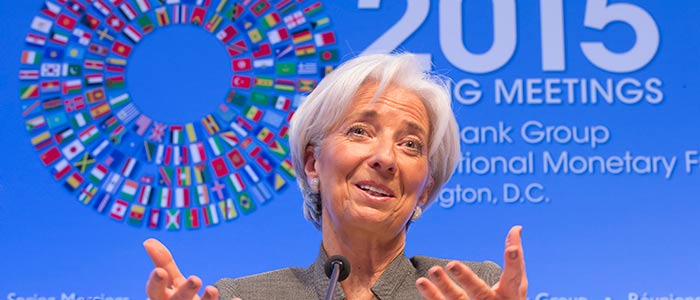WEb_IMF_ChristineLagarde_17169021875_5ac675797e_o.jpg

Christine Lagarde. Credit: IMF Staff Photo/Stephen Jaffe
In a speech at the Massachusetts Institute of Technology today, Lagarde said that fiscal policy will be the “first line of defence” as the world’s demography changes. More efficient public investments, more effective taxation, including of multinational companies, and reductions in energy subsidies were among her key recommendations.
“We need a multi-pronged policy response,” she said. “In other words, it is not enough to focus on one aspect, such as pushing through a pension reform. We need game changers.”
The first of these is entitlement reforms starting with healthcare, which accounts for the lion’s share of age-related expenditure increases, she explained.
As well as increasing competition among insurers and service providers, she said more targeted spending, more attention on primary and preventative healthcare, the promotion of healthier lifestyles and making more effective use of information technology will be required.
“If these efforts can be sustained over many years, it would help governments bend the cost curve,” she said.
“Another priority is lifting retirement ages to match longevity gains. This would bolster the pension system and extend the productive life of individuals.”
However, she added that policymakers need to ensure adequate safety nets for those who are not healthy enough to work longer and said flexible pension systems, which can respond to demographic shifts, for example by linking benefits to life expectancy, are favourable.
“More broadly, in the current environment of already depressed aggregate demand, we need savvy fiscal policy – one that supports demand while ensuring sufficient savings in pensions and healthcare.”
The second game changer is better tax systems and more efficient public expenditure.
This means broadening the base for value-added taxes, improving the taxation of multinational companies and strengthening tax compliance to ensure everybody pays their fair share.
On the spending side, she said there must be better management of public investment that mean “twice the growth ‘bang’ for their ‘buck’”, Lagarde suggested.
Energy pricing will also be key, she said, “not only for the public purse, but for the planet”. She called for more emphasis on energy taxation and less reliance on energy subsidies, which amounted to $5.3 trillion last year.
“This staggering number needs to come down so that these resources can be better used. Doing it now, when energy prices are low, makes that much easier,” the IMF chief stated.
However, she argued there is only so much that tax measures and efficient spending can achieve, and that a broad-based push to lift potential growth will also be necessary to provide a “fuller public purse”.
One way to do this is to add workers. She said one obvious group to bring into the labour market is women. The other is immigrants, who she highlighted can boost a country’s labour force, encourage investment and lift growth, provided they are well integrated.
Technical innovation will also be key, she continued, calling on governments to invest more in education and research and development, remove barriers to competition, and cut red tape.
“We all know that we must address a huge demographic challenge, so we can leave our economies and societies better than we found them. We all have a stake in this campground.”













